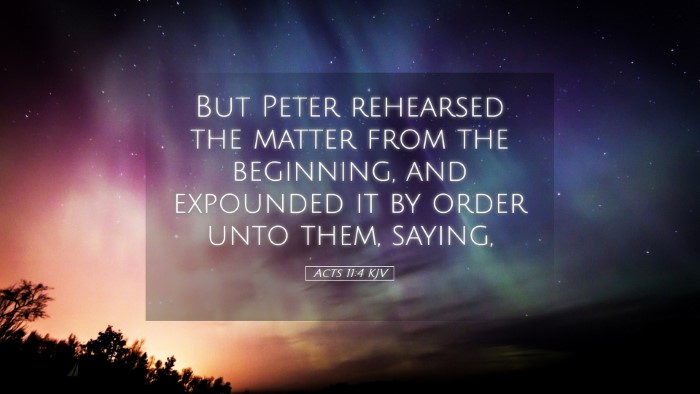Commentary on Acts 11:4
Verse Context: In Acts 11:4, Peter responds to criticisms regarding his interactions with Gentiles. This verse serves as a critical point where he recounts the events leading to the inclusion of Gentiles in the early Church, challenging the perceptions of the Jewish believers about the outreach to non-Jews.
Exegesis of Acts 11:4
Matthew Henry's Commentary: Matthew Henry emphasizes the necessity of Peter's response to the circumcised believers' critique. He highlights that Peter “expounded” the events, noting the importance of clarity in conveying God’s will. Henry remarks that Peter’s recounting of the vision he received from God illustrates divine preparation for the radical inclusion of Gentiles into the Church. This not only speaks to God’s sovereignty but demonstrates a transformative shift in the early Christian mission.
Albert Barnes’ Notes: Barnes focuses on the ethical implications of the narrative. He notes that Peter faced severe scrutiny from the believers in Jerusalem, which reflects the tensions within the early Church. Peter’s method of recapitulating his experience reinforces the theme of divine acceptance and the breaking of socio-religious barriers, consistent with the Gospel's universal message. Barnes implies that the Church must continually reevaluate its boundaries in light of God's unyielding grace.
Adam Clarke's Commentary: Clarke provides a detailed analysis, outlining the significance of the vision given to Peter about the unclean animals. He points out that this vision serves as a metaphor for the inclusion of the Gentiles, emphasizing that what God has cleansed should not be called common. Clarke's observations offer a theological framework suggesting that God’s grace transcends ethnic and cultural boundaries, and advocates for the extension of the Church’s mission to all of humanity.
Theological Insights
The Role of Vision in Guiding Faith: The vision bestowed upon Peter can be interpreted as an essential divine guide for the Church facing uncomfortable changes. The vocal proclamation of God's acceptance beckons believers to navigate their preconceived notions and biases effectively. The character of God is revealed in a radical love that is inclusive. Such insights are vital for pastors and theologians who seek to broaden their understanding of God’s intentions in a multicultural society.
Challenge and Response: The challenge faced by Peter from the circumcised believers teaches a critical lesson in humility and the willingness to defend God’s work. For students and theologians, this reflection sheds light on the importance of engaging in constructive dialogue regarding church tradition versus Scriptural revelations. It raises the poignant question: How open are we to divine action that breaks our established norms?
Practical Application
- Building an Inclusive Church: Acts 11:4 serves as a clarion call for churches today to actively pursue inclusivity and empathy towards those who differ in background, culture, or belief systems. This plea for inclusivity should shape congregational life and outreach initiatives.
- Communicating to Diverse Audiences: The importance of clear communication, as demonstrated by Peter, remains relevant. Pastors and leaders should strive to transparently articulate the mission and vision of the church, ensuring comprehension and engagement across diverse demographic groups.
- Encouraging Openness to the Holy Spirit's Direction: The narrative exemplifies the necessity for believers to remain sensitive to the leading of the Holy Spirit. This openness fosters a vibrant faith community where congregants are allowed to be influenced by divine revelations regardless of their historical context.
Conclusion
Acts 11:4 serves not merely as a historical account but as a beacon of theological reflection on God's inclusive love. Through the insights of esteemed commentators such as Matthew Henry, Albert Barnes, and Adam Clarke, we glean a rich understanding of divine engagement with humanity. As we navigate our ecclesiastical responsibilities, may we embody the spirit of inclusivity and grace towards all, demonstrating the profound love of Christ evident in this early church paradigm.


